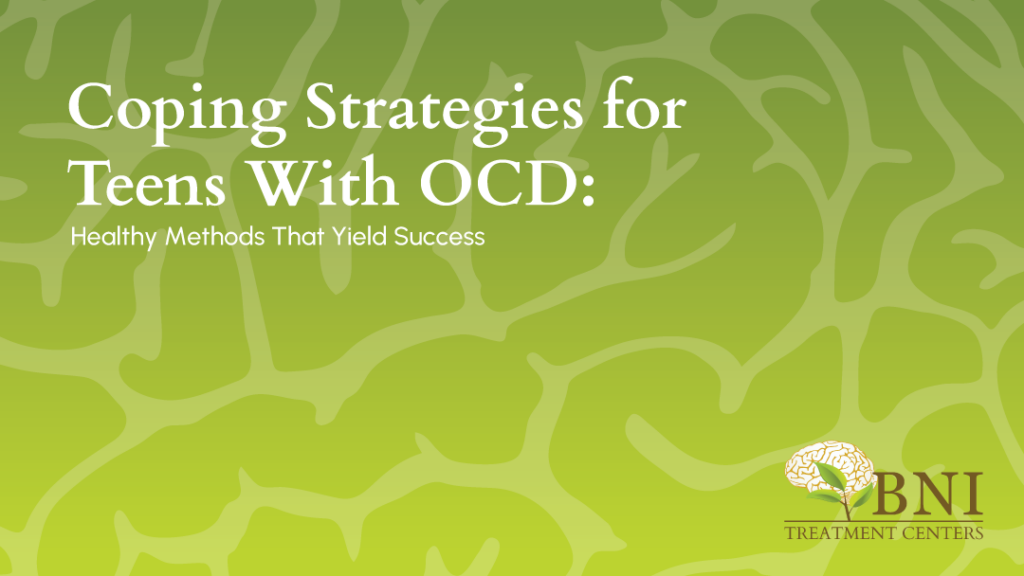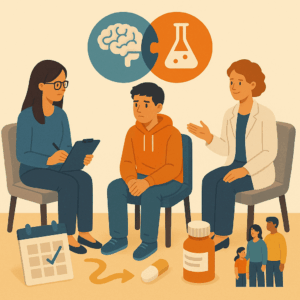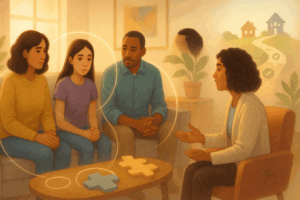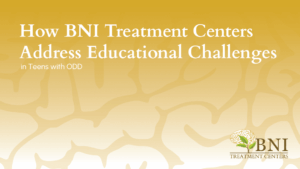
Obsessive-Compulsive Disorder (OCD) may present differently in adolescents than in adults, often leaving parents uncertain about how best to support their child. Developing healthy coping strategies for teens with OCD is often the first step, but what suggestions can parents make?
Besides the standard skills, such as meditation and deep breathing, your teen can benefit from a variety of other outlets they may never have considered.
In LA County, 27.5% of teens report needing help with their mental and emotional health. At BNI Treatment Centers, we offer science-backed treatment plans tailored to this specific age group, providing them with the tools they need to achieve success and maintain mental health. In this article, we will discuss coping strategies for teens with OCD and how parents can be effective in supporting the treatment process.
Understanding OCD in Teens: What It Really Looks Like
Obsessive-compulsive disorder (OCD) in adolescents is often misdiagnosed as typical teenage behaviors, such as a need for perfection or common mood swings. In reality, OCD is a chronic, debilitating mental health condition characterized by persistent, unwanted thoughts (obsessions) and repetitive behaviors or mental acts (compulsions) that the teen feels driven to perform to alleviate stress and anxiety.
OCD can present in several ways, such as excessive handwashing, repeatedly checking locks, counting rituals, intrusive fears about harm coming to loved ones, or needing items to be perfectly aligned. These behaviors significantly disrupt daily functioning, often impairing academic performance, damaging self-esteem, and interfering with social relationships.
In adults, OCD symptoms are often recognized, and it is understood that they are irrational. Adolescents, however, lack this insight, which leads to overwhelming feelings of anxiety provoked by these intrusive thoughts. To regain control, they begin to rely heavily on compulsive behaviors, making early diagnosis crucial to preventing symptom escalation.

Clinically Supported Coping Strategies for Teens with OCD
Most clinically supported coping strategies for OCD come from adult studies, and the same techniques are often implemented for adolescents. Research shows that cognitive behavioral models are effective in developing coping skills for OCD. In this specific study, meta-cognitive beliefs related to obsessions and compulsions were analyzed between adults and adolescents. It was noted that adolescents used distraction and worry as thought control strategies as much as adults. They differed in their use of social control and reappraisal, with adolescent males also reporting less frequent use of punishment as a strategy. Though the overall cognitive model works for all ages in OCD, meta-cognitive beliefs about superstition, punishment, and responsibility have higher importance in adolescence.
Helping Teens Challenge Intrusive Thoughts in Healthy Ways
Adolescents cannot control when intrusive thoughts will occur, though they are capable of challenging them and reducing the stress associated with them. These thoughts are not reflective of their true character or desires but are interpreted as threatening due to the OCD cycle. Common examples include fears of harming others, unwanted sexual thoughts, or obsessions related to morality or contamination.
Education is critical in understanding that these thoughts are not actions. Though unsettling, having a thought does not make it an action that has already happened. A coping technique for this is thought labelling, expressing to themselves that this is just an “OCD thought.” This takes away the thought’s control and helps the teen to build the skill of recognition.
Cognitive defusion is a therapeutic coping strategy used to manage intrusive thoughts. This technique involves helping the adolescent observe the thought as a transient mental event, such as visualizing it as a passing cloud or background noise, rather than engaging with its content. This promotes cognitive distancing, allowing the teen to acknowledge the presence of the thought without assigning it significance or acting upon it.
4 Daily Habits That Support OCD Management in Adolescents
Structured routines are imperative for adolescents managing OCD, as they reduce the uncertainty that can trigger compulsions or exacerbate anxiety. Ways for teens to implement strategic routines include:
- Digital boundaries: Excessive screen time, particularly related to reassurance-seeking or compulsive research, can reinforce OCD patterns.
- Self-monitoring: Tracking triggers and progress through a journal or app provides insight into patterns and helps the teen recognize gradual improvements over time.
- Implement self-care: Beyond regular bathing and grooming, self-care also involves emotional well-being. This can be achieved through deep, quiet breathing, focusing on clearing the mind of thoughts, as well as writing intrusive thoughts on paper and physically discarding them. Emotional self-care brings a sense of calm and reduces anxiety.
- Seek support: Whether through a trusted parent, friend, or counselor, seeking support during challenging thoughts will help the teen refocus and reduce stress.
Though it may be difficult on certain days, encouraging teens to participate in normal activities like school, hobbies, and social events helps reduce the OCD’s dominance in their daily life. Consistency, rather than intensity, is key when building habits that support long-term mental wellness.
Family Roles in Managing OCD: What Helps and What Hurts
Parents and family members have roles in raising adolescents, and the same is true with managing their child’s OCD. Despite this, many parents are ill-equipped with what is helpful and hurtful in these cases. Studies have shown that parents of adolescents with OCD often utilize negative approaches, adding stress to themselves and their child. Parents who implement high levels of daily accommodation, such as observing rituals or waiting for the child, were met with higher levels of negative affect and more frequent use of all coping strategies, especially escape-avoidance, taking responsibility, and seeking social support. This was particularly higher in mothers. Without parental education and the ability to cope for themselves, the family dynamic will continue to decline.
Through psychotherapy for the family as a whole, parents become familiar with techniques for aiding their child without accommodation. This is accomplished through positive communication, validating the teen’s feelings, reducing approval of compulsions, and creating a predictive home environment. A collaborative family approach is essential for maintaining mental well-being within the household.
When Coping Isn’t Enough: When to Seek Professional Help
While coping skills and family support are proven strategies, there are clear indicators that professional intervention is necessary. If OCD symptoms begin to impair the teen’s ability to attend school, maintain friendships, sleep, or engage in self-care, it is time to seek help from a licensed mental health professional with experience in adolescent OCD.
A comprehensive psychological evaluation will help differentiate OCD from other disorders. Proper diagnosis is critical for effective treatment planning. This helps professionals address any co-occurring conditions such as depression, generalized anxiety disorder, or substance use, which can complicate the treatment process. Confirming OCD will provide a clear treatment path for both professionals and the adolescent.

Getting Help for Teens with OCD at BNI Treatment Centers
OCD treatment for teens provides the skills needed to challenge intrusive thoughts, reduce compulsions, and lead a life full of mental well-being. OCD is not only treatable, but also manageable, and your teen will have all the tools to continue to thrive.
At BNI Treatment Centers, our psychiatrist-led team utilizes evidence-backed therapies for adolescents between the ages of 12 and 17. We specialize in the various mental health conditions that can affect teens, including OCD, and provide specific treatment plans to fit their individual needs. Call us today at (888) 522-1504 to learn more about our program offerings.
BNI Treatment Centers: Science-based, evidence-backed, compassion-led.




